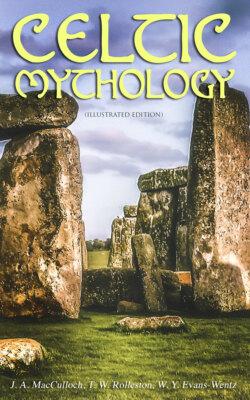Читать книгу CELTIC MYTHOLOGY (Illustrated Edition) - T. W. Rolleston - Страница 7
На сайте Литреса книга снята с продажи.
Alexander the Great
ОглавлениеWhen the counter-movement of Hellas against the East began under Alexander the Great we find the Celts again appearing as a factor of importance. In the fourth century Macedon was attacked and almost obliterated by Thracian and Illyrian hordes. King Amyntas II. was defeated and driven into exile. His son Perdiccas II. was killed in battle. When Philip, a younger brother of Perdiccas, came to the obscure and tottering throne which he and his successors were to make the seat of a great empire he was powerfully aided in making head against the Illyrians by the conquests of the Celts in the valleys of the Danube and the Po. The alliance was continued, and rendered, perhaps, more formal in the days of Alexander. When about to undertake his conquest of Asia (334 B.C.) Alexander first made a compact with the Celts “who dwelt by the Ionian Gulf” in order to secure his Greek dominions from attack during his absence. The episode is related by Ptolemy Soter in his history of the wars of Alexander.5 It has a vividness which stamps it as a bit of authentic history, and another singular testimony to the truth of the narrative has been brought to light by de Jubainville. As the Celtic envoys, who are described as men of haughty bearing and great stature, their mission concluded, were drinking with the king, he asked them, it is said, what was the thing they, the Celts, most feared. The envoys replied: “We fear no man: there is but one thing that we fear, namely, that the sky should fall on us; but we regard nothing so much as the friendship of a man such as thou.” Alexander bade them farewell, and, turning to his nobles, whispered: “What a vainglorious people are these Celts!” Yet the answer, for all its Celtic bravura and flourish, was not without both dignity and courtesy. The reference to the falling of the sky seems to give a glimpse of some primitive belief or myth of which it is no longer possible to discover the meaning.6 The national oath by which the Celts bound themselves to the observance of their covenant with Alexander is remarkable. “If we observe not this engagement,” they said, “may the sky fall on us and crush us, may the earth gape and swallow us up, may the sea burst out and overwhelm us.” De Jubainville draws attention most appositely to a passage from the “Táin Bo Cuailgne,” in the Book of Leinster7, where the Ulster heroes declare to their king, who wished to leave them in battle in order to meet an attack in another part of the field: “Heaven is above us, and earth beneath us, and the sea is round about us. Unless the sky shall fall with its showers of stars on the ground where we are camped, or unless the earth shall be rent by an earthquake, or unless the waves of the blue sea come over the forests of the living world, we shall not give ground.”8 This survival of a peculiar oath-formula for more than a thousand years, and its reappearance, after being first heard of among the Celts of Mid-Europe, in a mythical romance of Ireland, is certainly most curious, and, with other facts which we shall note hereafter, speaks strongly for the community and persistence of Celtic culture.9
